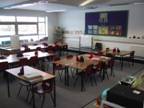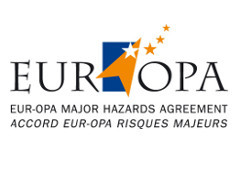School Education

- more receptive to messages of prevention (curious and not conditioned);
- better information "transmitters” within their family;
- most vulnerable targets with respect to risks.
Two types of activities were consequently privileged for this age group:
- awareness to risks prevention,
- safety setting of school establishments.
Education to risks knowledge
A series of conferences on this topic, organized by the European Centre for Risk Prevention (CLST) of Sofia (Bulgaria), allowed to compare the initiatives engaged in the Member States and to coordinate the network of the Centres working in this field.
Relevant actions were thus identified and some of which are already committed:
- “Risk Sciences: training at the school level" (1997)
To integrate a risks prevention training (provided by sectoral or specific teachers) at the pre-school/school level programs;
To work out a common base training on risks prevention and to make an inventory of the pedagogical/multimedia tools on risks prevention; To promote an Euro-Mediterranean Day on Risks Prevention and Childhood.
- “Risk prevention education to school and pre-school levels” (1998)
To recognize the right of children to risks education and prevention, protection and mutual help measures training;
To support a pilot project on risks prevention training for school children via new information technologies;
Pilot project "Seismic risk in school establishments” (physical behaviour of the building, internal organization in front of the seism, reflex attitudes to hold...).
- "School community in front of risks management” (2000)
To stress the right of the population (especially that at school-level) to be informed as regards risks prevention and behaviour to be adopted in case of crisis;
To create a Euro-Mediterranean Network of school establishments for the promotion of the “Culture of Risk” based on the installation of safety plans;
To write legal training modules on safety in school establishments available for the trainers’ training programmes.
Site Be Safe.Net

This project has as origin the conclusions of the meeting on "Education to risks prevention at school level” from October 2002 in Sofia which decided the creation of a Website intended for school establishments actors (school-level children, teachers, administrative and technical staff, families and local authorities) in order to:
- Inform: regulations, tools for sensitizing and preparation to the risk, experiments;
- Train: children, teachers, administrative and technical staff, local authorities;
- Produce: games, videos, photographs...;
- Interact: newsgroups and electronic conferences, investigations.
Link to the website: http://www.besafenet.net/
Risks prevention in school establishments

- Evaluation of the specific vulnerability of the establishment,
- Take into account persons’ safety,
- Staff training (head of establishment, teachers, administratives, technicians),
- Awareness and association of the pupils’ parents,
- Organization of the internal safety plan and posting of instructions,
- Periodic simulations with common analysis of the experience feedbacks,
- Integration in the educational project of the establishment.
In parallel, under the impulse of the European University Centre for Cultural Heritage (CUEBC) of Ravello (Italy), an Euro-Mediterranean Network of School Establishments for the promotion of the risk culture joining this Protocol was set up. Its major objective is the analysis of the various types of intrinsic risks of school establishments related to their structures, their vulnerability and their environment in order to define an establishment project specifying:
an adequate adjustment project of the establishment structures;
a teaching project for the establishment’s pupils, families and staff.



